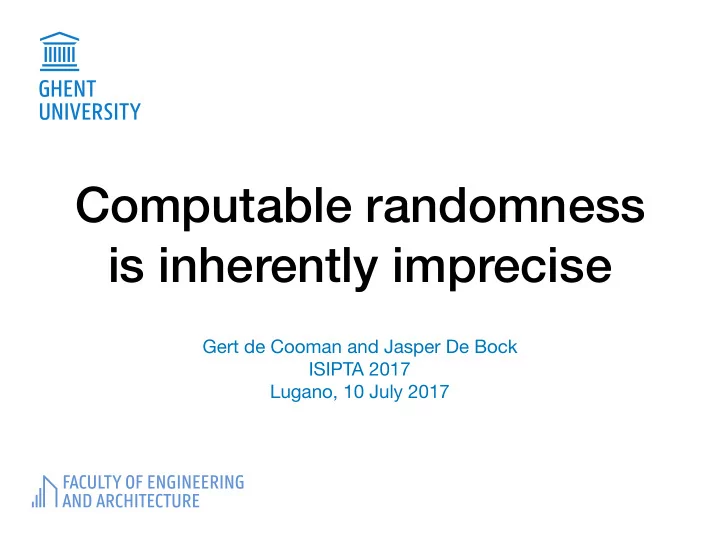

Computable randomness is inherently imprecise Gert de Cooman and Jasper De Bock ISIPTA 2017 Lugano, 10 July 2017
A single forecast
A single forecast
A single forecast
Gambles available to Sceptic: interval forecast f ( 0 ) f ( 1 ) ≤ f ( 0 ) f ( 1 ) ≥ f ( 0 ) E ( p f ) = 0 f ( 1 ) E p ( f ) = 0
Gambles available to Sceptic: interval forecast f ( 0 ) ) 0 ( f ≤ ) ) 0 1 ( ( f f ≥ E ( ) r f ) 1 = ( 0 f f ( 1 )
Gambles available to Sceptic: interval forecast f ( 0 ) f ( 1 ) ≤ f ( 0 ) f ( 1 ) ≥ f ( 0 ) E 0 ( f ) = 0 f ( 1 ) E 1 ( f ) = 0
Event tree 0 1 00 01 10 11 000 001 010 011 100 101 110 111
Forecasting system I ⇤ 0 1 I 0 I 1 00 01 10 11 I 00 I 01 I 10 I 11 000 001 010 011 100 101 110 111
Computable randomness of a sequence I ⇤ 0 1 I 0 I 1 00 01 10 11 I 00 I 01 I 10 I 11 000 001 010 011 100 101 110 111
Consistency results I 1 0 1 I 2 I 2 00 01 10 11 I 3 I 3 I 3 I 3 000 001 010 011 100 101 110 111
Constant interval forecasts I 0 1 I I 00 01 10 11 I I I I 000 001 010 011 100 101 110 111
Church randomness
The set filter of forecasts that make a sequence random 0 p C ( ω ) p C ( ω ) 1
Gambles available to Sceptic: interval forecast f ( 0 ) f ( 1 ) ≤ f ( 0 ) f ( 1 ) ≥ f ( 0 ) E 0 ( f ) = 0 f ( 1 ) E 1 ( f ) = 0
The set filter of forecasts that make a sequence random 0 p C ( ω ) p C ( ω ) 1
Gambles available to Sceptic: interval forecast f ( 0 ) ) 0 ( f ≤ ) ) 0 1 ( ( f f ≥ E p ( f ) = 0 ) 1 ( f f ( 1 ) E p ( f ) = 0
The set filter of forecasts that make a sequence random 0 p C ( ω ) p C ( ω ) 1
Interval randomness: a simple example
Point randomness, but not quite
And where do we go from here? 1. Is it possible to use an equivalent Martin-Löf type approach, using randomness tests? 2. Can we take other notions of computability into account? 3. Are similar results possible on a prequential approach? 4. Our results seem to allow for an ontological interpretation of imprecise probabilities: how do we do statistics with them?
And where do we go from here? 1. Is it possible to use an equivalent Martin-Löf type approach, using randomness tests? 2. Can we take other notions of computability into account? 3. Are similar results possible on a prequential approach? 4. Our results seem to allow for an ontological interpretation of imprecise probabilities: how do we do statistics with them?
And where do we go from here? 1. Is it possible to use an equivalent Martin-Löf type approach, using randomness tests? 2. Can we take other notions of computability into account? 3. Are similar results possible on a prequential approach? 4. Our results seem to allow for an ontological interpretation of imprecise probabilities: how do we do statistics with them?
And where do we go from here? 1. Is it possible to use an equivalent Martin-Löf type approach, using randomness tests? 2. Can we take other notions of computability into account? 3. Are similar results possible on a prequential approach? 4. Our results seem to allow for an ontological interpretation of imprecise probabilities: how do we do statistics with them?
Recommend
More recommend